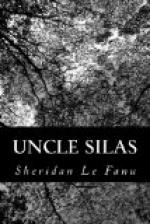Dudley hesitated gruffly at the door, but another look from his father dismissed him.
’And now, my dear, you are to remember that Dudley has fine qualities—the most affectionate son in his rough way that ever father was blessed with; most admirable qualities—indomitable courage, and a high sense of honour; and lastly, that he has the Ruthyn blood—the purest blood, I maintain it, in England.’
My uncle, as he said this, drew himself up a little, unconsciously, his thin hand laid lightly over his heart with a little patting motion, and his countenance looked so strangely dignified and melancholy, that in admiring contemplation of it I lost some sentences which followed next.
’Therefore, dear, naturally anxious that my boy should not be dismissed from home—as he must be, should you persevere in rejecting his suit—I beg that you will reserve your decision to this day fortnight, when I will with much pleasure hear what you may have to say on the subject. But till then, observe me, not a word.’
That evening he and Dudley were closeted for a long time. I suspect that he lectured him on the psychology of ladies; for a bouquet was laid beside my plate every morning at breakfast, which it must have been troublesome to get, for the conservatory at Bartram was a desert. In a few days more an anonymous green parrot arrived, in a gilt cage, with a little note in a clerk’s hand, addressed to ‘Miss Ruthyn (of Knowl), Bartram-Haugh,’ &c. It contained only ‘Directions for caring green parrot,’ at the close of which, underlined, the words appeared—’The bird’s name is Maud.’
The bouquets I invariably left on the table-cloth, where I found them—the bird I insisted on Milly’s keeping as her property. During the intervening fortnight Dudley never appeared, as he used sometimes to do before, at luncheon, nor looked in at the window as we were at breakfast. He contented himself with one day placing himself in my way in the hall in his shooting accoutrements, and, with a clumsy, shuffling kind of respect, and hat in hand, he said—
’I think, Miss, I must a spoke uncivil t’other day. I was so awful put about, and didn’t know no more nor a child what I was saying; and I wanted to tell ye I’m sorry for it, and I beg your pardon—very humble, I do.’
I did not know what to say. I therefore said nothing, but made a grave inclination, and passed on.
Two or three times Milly and I saw him at a little distance in our walks. He never attempted to join us. Once only he passed so near that some recognition was inevitable, and he stopped and in silence lifted his hat with an awkward respect. But although he did not approach us, he was ostentatious with a kind of telegraphic civility in the distance. He opened gates, he whistled his dogs to ‘heel,’ he drove away cattle, and then himself withdrew. I really think he watched us occasionally to render these services, for in this distant way we encountered him decidedly oftener than we used to do before his flattering proposal of marriage.




